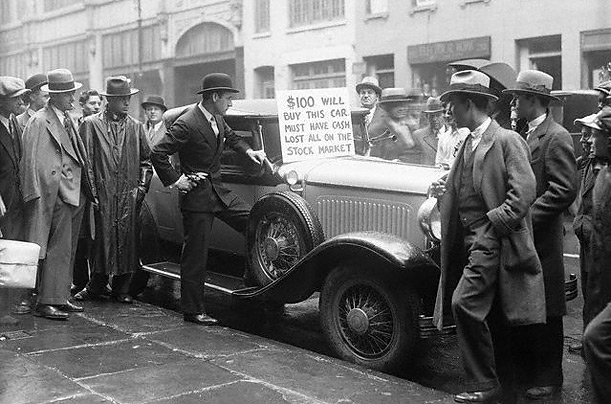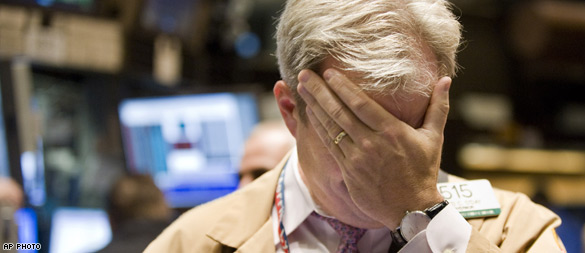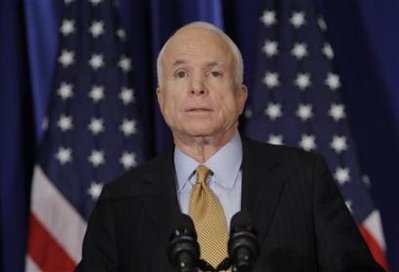“‘Taxpayers are subsidizing a legislative agenda that is inimical to their interests and offensive to what the whole TARP program is about,; said William Patterson, executive director of CtW Investment Group, an activist group affiliated with a coalition of labor unions. ‘It’s business as usual with taxpayers picking up the bill.” Sigh. The WP’s Dan Eggen reports on GM and a host of financial firms using bailout money to lobby for the status quo. “Major recipients of federal bailout money spent more than $10 million to lobby lawmakers in the first three months of 2009, including arguing against pay limits for corporate executives, according to newly filed disclosure records.“
Tag: TARP
GOP to Big 3: Drop Dead. | WH to the Rescue?
“‘Under normal economic conditions we would prefer that markets determine the ultimate fate of private firms,’ the White House statement said. ‘However, given the current weakened state of the U.S. economy, we will consider other options if necessary — including use of the TARP program — to prevent a collapse of troubled automakers.’” After Senate Republicans manage to kill the auto bailout bill — apparently, GOP conservatives wanted to see more arbitrary union-busting therein — the Dubya administration, to its credit, announces it may just move ahead anyway. “A precipitous collapse of this industry would have a severe impact on our economy, and it would be irresponsible to further weaken and destabilize our economy at this time.”
I can’t say I ever expected to pat this administration on the back for broadly interpreting its legislative mandate. But, we live in strange times, I guess.
Said Michigan Governor Jennifer Granholm of the bailout bill’s demise in the Senate: “Their no vote is an astounding blow. They have chosen to ignore the livelihood of 3 million Americans, 3 million families, and in the process have chosen to drive the American manufacturing industry — and perhaps the American economy — into the ground.” Said Republican L. Brooks Patterson of his party’s behavior in Congress: “The arsenal of democracy is under attack by the arsenal of hypocrisy.” (The world markets didn’t like it much either.)
Blue Monday.

“‘The fact is people are scared and the only thing they’re doing is selling,’ said Ryan Detrick, senior technical strategist at Schaeffer’s Investment Research. ‘Investors are cleaning out portfolios and getting rid of everything because nothing seems to be working.‘” And on the first Monday of that October, the Dow plunged 800 points…I know I spend more time than most contemplating the 1920’s, but I can’t be the only person out there for whom this is all starting to sound eerily familiar…
Update: Hold those dismal historical analogies just yet: Thankfully for everyone, the rally monkey roared at the end of the day, bringing today’s losses to only 370 or so. Still, it’s safe to say things are looking a tad, er, erratic on Wall Street at the moment.
Bailout, or we all sink.

As I said here, I’m not all that happy about the nation having to subsume the risk, and ride to the rescue of, the many banks and Wall Street types that profited massively from these obviously suspect mortgage deals. But, what else is there to do? As with so much else occurring over the past eight years, it befalls us now to clean up the mess left by the free market fundies of late. I just hope we learn something from the economic consequences of this latest binge of free-market fraudulence, before they grow too dire. To wit, whatever the corporate-funded right tells you about self-regulating markets, we need, and will continue to need, real refs on the field.
Update: Uh oh. The bailout compromise dies in the House, prompting the Dow Jones to swiftly tank 700 points. “The measure needs 218 votes for passage. Democrats voted 141 to 94 in favor of the plan, while Republicans voted 65 to 133 against. That left the measure with 206 votes for and 227 against.“
As the TIME article linked above noted before the vote, “the candidate with the most riding on Monday’s vote is McCain, who backed the concerns of conservatives in the House over the initial agreement…[I]f a majority of the House Republicans don’t vote for the measure, McCain could lose political face. ‘If McCain cannot persuade them, it is hard to portray him as a leader,’ said Clyde Wilcox, a political science professor at Georgetown University.” So, that’s the silver lining, I guess. But the bad news now, alas, is considerably worse.
Suspension of Disbelief.

“I am confident that before the markets open on Monday we can achieve consensus on legislation that will stabilize our financial markets, protect taxpayers and homeowners, and earn the confidence of the American people. All we must do to achieve this is temporarily set politics aside, and I am committed to doing so.” Uh, but I thought the fundamentals of our economy were strong! Apparently now cognizant of our recent economic travails, John McCain announces he’s temporarily suspending his campaign to focus on the Wall Street bailout, and has asked for Friday’s foreign policy debate to be delayed.
If we learned anything from the Palin debacle, it’s that the mythical maverick isn’t above pulling a ridiculous and transparent stunt when he’s starting to sweat the polls. Well, here we go again. Update: Sez Obama, the debate is on. Damn right.
We are all “Socialists” now.
“Let’s be clear about why we’re facing a crisis that could pull down the global financial system. The irresponsibility of individuals who bought houses they couldn’t quite afford pales in comparison with the irresponsibility of the financial wizards who built on those shaky mortgages a towering edifice of irrational faith. Someone in the government should have looked at all those trillions of dollars’ worth of mortgage-backed securities and collateralized debt obligations and credit default swaps and demanded that Wall Street prove that all, or even most, of this purported money was real. But we’re in the eighth year of the Bush administration; adult supervision left the building long ago.” — Eugene Robinson.
Boy, nothing like panic and near-catastrophe in the banking and financial sectors to turn all the stark raving free-market fundies redder than Eugene Debs on May Day, eh? In any event, once again we’re on the verge of learning the hard way that Wall Street does a really lousy job of regulating itself, and that, when push comes to shove, it’s the “don’t-tread-on-me” entrepreneurial capitalists among us who are the first to beg for Big Guvmint to come in and bail them out — at above-market prices. “The only emergency is on Wall Street, and that is entirely of Wall Street’s making. It was the banks that made the loans, the banks that bought the paper, the banks that dumbly believed the models that said that housing prices wouldn’t collapse…How touching to see executives from the likes of Lehman Brothers, not normally an institution associated with widows and orphans, squawk about cutthroat tactics.” And I don’t seem to remember the economic Big Boys, or their mostly-GOP minions in Congress, show such concern about the vagaries of risk when the plight of ordinary folks was being discussed, vis a vis the egregious bankruptcy bill of 2005.
Of course, we can’t just let many of our major financial institutions implode without consequence, and — even though delegating the Dubya administration any more “emergency powers” at this point seems like a colossally bad idea — it seems a given that something will have to be done to sort out all this out, and it will no doubt end up costing taxpayers and aggrieved homeowners a bundle. I just hope, when the dust settles, we remember this time how this all came about, and not just let the idiotic free-market fundies blather on about tax-and-spend liberals killing the entrepreneurial spirit every time some sort of regulatory apparatus is discussed in Washington. We know how that movie ends.
Bare Stearns. | We are all NOLA?
“The Wall Street titans have turned into a bunch of welfare clients. They are desperate to be bailed out by government from their own incompetence, and from the deregulatory regime for which they lobbied so hard…It’s just fine to make it harder for the average Joe to file for bankruptcy, as did that wretched bankruptcy bill passed by Congress in 2005 at the request of the credit card industry. But the big guys are ‘too big to fail’ because they could bring us all down with them.” After the Bear Stearns deal and all it would seem to portent about the condition of the Dubya economy, E.J. Dionne reads the riot act to free market fundies.
In related news, WP’s Dan Froomkin’s notes how Dubya’s handling of the economy is now being compared to the aftermath of Katrina. ‘As the storm clouds gathered, was President Bush once again asleep at the wheel? A consistent theme in today’s political and economic coverage is that Bush’s failure to recognize the severity of the ongoing financial crisis and act accordingly is reminiscent of his disastrously slow and inept response to Hurricane Katrina….’As with the war in Afghanistan, the Iraqi war aftermath, the Hurricane Katrina disaster and current efforts at Mideast peace, investors are concerned that the president is responding too late and with inadequate understanding, resources and creativity.'”

